'We Cannot Be Clock-Worked Into Acceptance of This Brutal Violence'
Fatima Bhutto meets Francesca Albanese, the UN special rapporteur on Palestine turned internet idol, who has become a 'reluctant chronicler of genocide.'
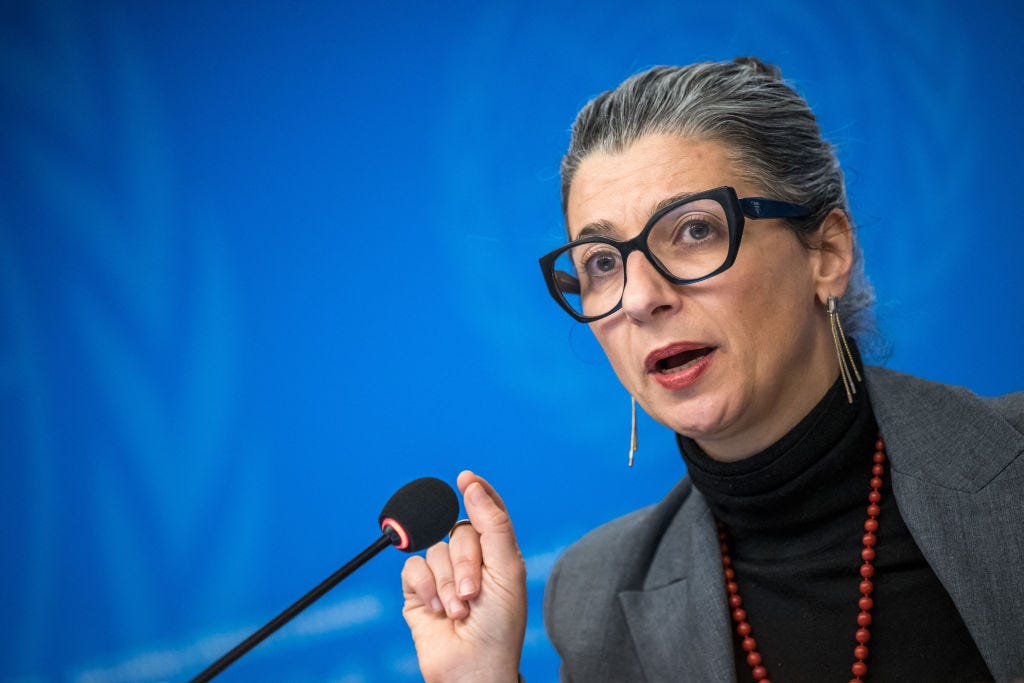
It happened almost overnight. In late 2023, Francesca Albanese, the UN special rapporteur on the Occupied Palestinian Territories, international law expert, and writer was catapulted onto the world stage when she simultaneously became – in her own words – “a reluctant chronicler of genocide,” an internet idol to her many admirers who study and share her press conferences and viral diplomatic interventions, and a “Hamas apologist” according to right-wing Zionists who stalk her every move. UN Watch, a pro-Israel organization whose seeming mission is to eradicate any shred of criticism of the state worldwide and for all eternity, has a particular obsession with Albanese. Their homepage displays a lurid campaign titled #firefrancesca.
Unlike her public remonstrations, Albanese laughs easily and radiates warmth and good humor. Wherever she goes, she seems to become the hive, the epicenter of attention and action, and even through this limited lens of Zoom, over the days we speak, I watch her husband, children, and children’s friends orbit her, gravitating towards her. When I mention the many enemies her outspoken defense of the Palestinian people has cultivated, Albanese doesn’t seem overly perturbed. “I have this device of hope, as we say in Italian,” she answers. “Yes, there are ideological enemies, but the moment people start engaging with me, I see that it’s hard for them to hate me. I tend to elicit sympathy face-to-face instead of hate. And this is something the haters hate.”
Our first Zoom call opens with her familiar face, which I’ve spent more than the last 15 months watching on television, across social media, and via streamed UN meetings. Albanese has just spent her first week off in months. She went on a trip to Albania with her family last summer, but that didn’t really count as she spent hours in the evening preparing a submission to the International Criminal Court. Today she’s in Valle D’Aosta in Italy, up in the mountains, and enjoying the euphoria of time with her family. “It’s been beautiful not to watch the news,” she exhales. She is wearing her trademark thick black-rimmed glasses, her salt and pepper hair perfectly disheveled, and colorful earrings that look like a red poppy in bloom.
Life at home is less intense than the public world Albanese inhabits. There are no pets because her husband “is allergic to the concept of dependence,” but plenty of books (she is rereading Anthony Lowenstein’s The Palestine Laboratory) by literary figures of inspiration, including Edward Said and Primo Levi, who she feels especially close to as an Italian, and friends whom she once loved cooking for though she rarely has the time now. She speaks five languages – Italian, French, Spanish, English, and Bahasa Indonesian – six if you consider Arabic, which Albanese doesn’t. She studied it but doesn’t consider herself fluent in it anymore. Though she is a trained yoga teacher, Albanese doesn’t have the time to teach anymore either though she practices when she can and is devoted to her daily meditation, promising that you don’t want to engage with her on the days that she misses the calming practice.
Albanese grew up in a socialist home where her father often spoke about politics and foreign policy was discussed during family meals – a nuclear scene that she now replicates with her own family. She describes the Italy she grew up in as one where Palestine was almost a domestic issue – unthinkable today in Giorgia Meloni’s Italy, where fascist salutes are raised at political gatherings and protesters are clubbed by police. One of her earliest memories of something happening outside her home country was the massacre of Palestinian refugees at Sabra and Shatila in 1982, and yet, when she began studying law, Albanese didn’t intend to focus on Palestine.
It wasn’t until she was doing her Masters at the School of Oriental and African Studies (SOAS) in London that the question of Palestine illuminated itself to Albanese. She understood that Palestine had to be advocated for on the grounds of international law, not just street activism. She didn’t have “the impulse of the humanitarian,” at least not fully. Rather, it was a “profound sense of outrage in the face of protracted injustice” that turned her onto the path of Palestine advocacy.
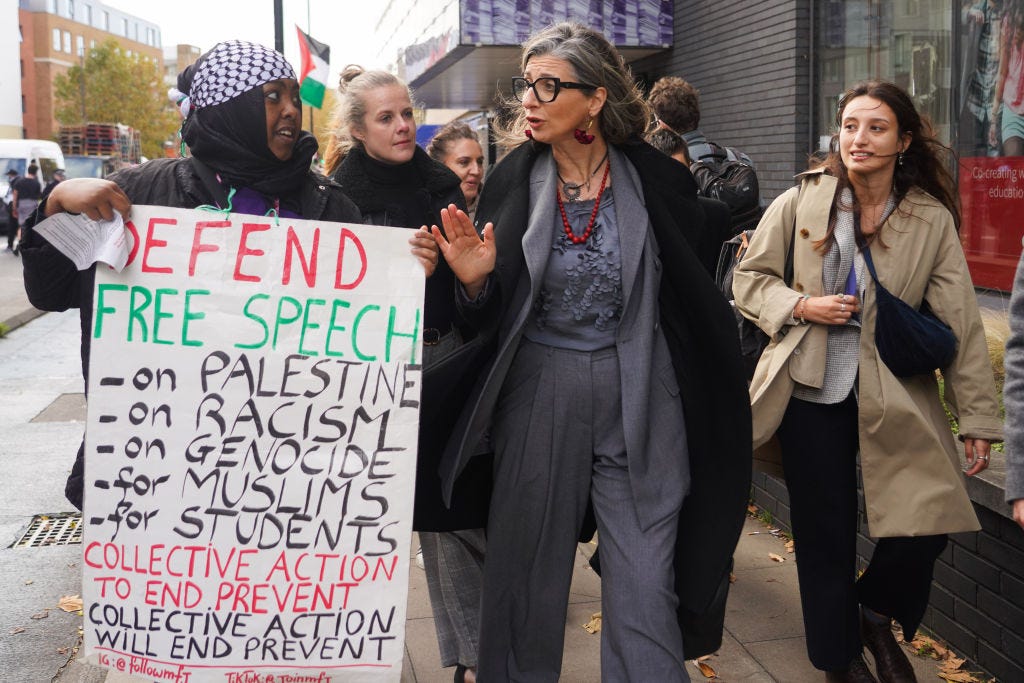
“I’ve lived it,” she says in her characteristic staccato, “and I’ve studied it primarily through the experience of Palestinian refugees, and when you do that, you cannot escape the Nakba. You cannot escape the reality that Palestinians are, first and foremost, Nakba survivors. It’s unmissable, and because of that, I’m brought to challenge the mainstream narrative that dominates the debate – that of a conflict.” Beyond which, if Albanese is a believer in anything it’s the idea of justice. It comes up again and again in conversation, and she speaks of justice and international law as its guarantor with the fervor of a believer – the same way the faithful revere their prophets. That international law exists and has simultaneously been “betrayed over and over again in the name of an ideology and at the expense of the rights of the Palestinians,” Albanese shakes her head. “It’s something that I. Cannot. Stand.”
A Seismic Moment
When Albanese was 33 years old, she moved to Jerusalem to work in UNRWA’s Department of Legal Affairs. She had visited the ancient city for the first time the previous year, in 2009. It would be where Albanese and her husband lived before they were married in Stromboli and where her first child was conceived. She recalls the time there as “beautiful but also painful” and notes she was never truly comfortable working there as a lawyer. There was the home she loved in Musrara, the flower-lined West Jerusalem neighborhood founded by Arab Christians in the 19th century. Though it should have been institutional policy, in her mind, not to rent refugee property, Albanese asked UNRWA’s legal adviser to check what the story was of the home. They came back to her and said if she liked the house, she should live in it, but they couldn’t be sure the original owners weren’t displaced.' “It doesn’t matter the charm of the place,” Albanese says, “I’m happy I didn’t live there because the thought that this could have been property taken from refugees wouldn’t have let me sleep at night.”
When the Russian writer Anton Chekov said, “Any idiot can face a crisis, but it’s the day-to-day business of living that wears you out,’ he was not thinking of grocery shopping, but he could have been. Albanese and her husband – whom she calls as radical as she is on ethical matters – had “the most politicized fridge in Jerusalem.” Nothing inside it came from the settlements. A colleague recently reminded her jokingly of the moment she came into their office, flush with the realization that she wasn’t the lawyer of Palestinian refugees as she imagined she would be, but the lawyer of an institution. To meet neutrality regulations, everything had to be so depoliticized – from the agency to the plight of the Palestinians – and after three years there, Albanese was out of steam from dealing with the maze of depoliticized politics. She left towards the end of 2012, right when the Gaza war of that year had begun, and thought that she was “done with Palestine.”
“I didn’t want to have anything to do with it anymore,” she recounts, shaking her head. She was depressed and exhausted. And then Israel’s 2014 assault on Gaza began.
Operation Protective Edge, as it was called by Israel, saw a massive use of firepower – more than 6,000 airstrikes on Gaza over the 50-day assault, with some 50,000 tank and artillery shells fired. Over 2,000 Palestinians were killed and 11,000 others injured – 10% of whom suffered permanent disabilities.
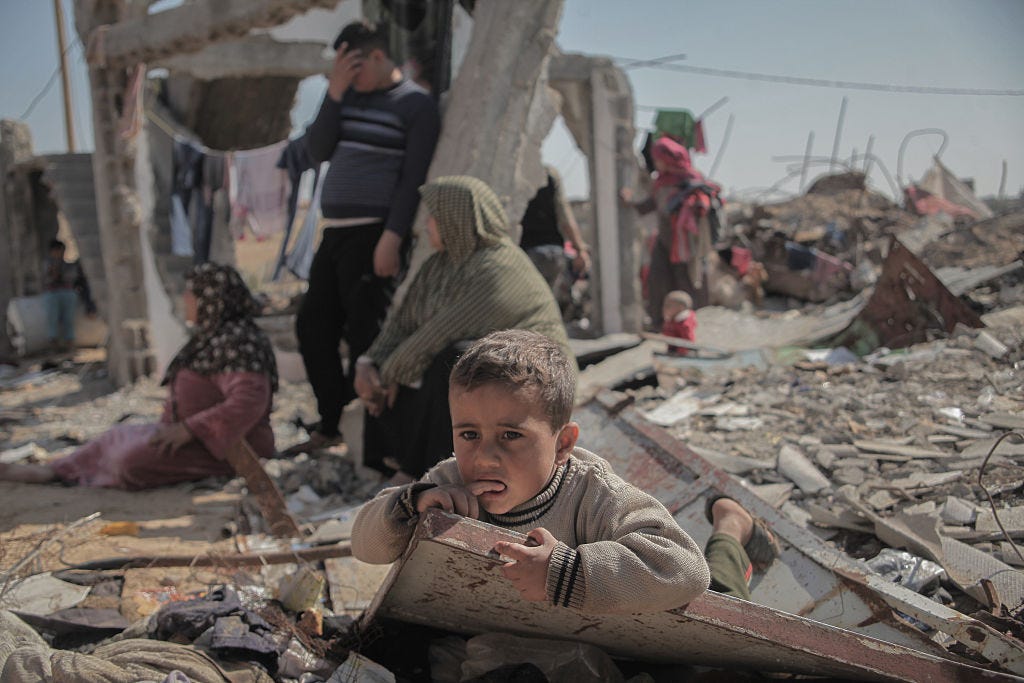
Albanese felt devastated by 2014. It was, she says, a “seismic” moment for her. She remembers holding her first child, Leila, watching the atrocities, and hearing about colleagues in Gaza who had been killed. “I saw people really punished for being Palestinian,” she recalls, “I felt a sense of impotence, and this is when I started getting engaged again. I knew that I couldn’t live with this feeling of impotence.” She pauses. “I don’t have that feeling over the past 14 or 15 months because I know that I can at least speak out using all the might of international law.”
And speak out she certainly has done. Her transparent outrage, her indignation at bad faith questions and lack of patience for snarky, gotcha journalists, her refusal to follow established scripts, her passionate tweets against the dehumanization of a besieged people, her distaste for politicians covering for ethnic cleansing – all of this marks Albanese as separate from her peers and it is this that has illuminated her as an uncommon voice of morality in the West.
“I’m cognizant of the fact that I can speak unapologetically to power…I don’t feel intimidated at all – and it’s new to me. I didn’t know I had that in me.”
-Francesca Albanese
She scolded Piers Morgan for trafficking in the debunked “beheaded babies” story pushed by Israel defenders and apologists, holding up a finger at him. Even the normally loquacious anchor fumbled as he tried to recover.
There was the magnificent eye roll when Albanese was reminded that David Lammy, Britain’s foreign secretary, was a lawyer. “It’s not the numbers of those killed that determine genocide, and any lawyer would know that, so I was surprised,” she shrugged on video. And she went viral for her exasperated response to a journalist in Canada asking her whether Israel had a right to exist. “Israel does exist,” Albanese replied, as though talking to an incredibly thick plank, “It is a recognized member of the United Nations. Besides this, there is no such thing in international law like ‘a right to exist.’ Does Italy have the right to exist? Italy exists…what is enshrined in international law is the right of a people to exist. So, the state is there, and it’s protected as a member of the United Nations. Does this justify the right of erasure of another people? Hell no.”
“I’m cognizant of the fact that I can speak unapologetically to power,” Albanese tells me over the phone. “I don’t feel intimidated at all – and it’s new to me. I didn’t know I had that in me.” It’s a claim worth pushing back on. Albanese hardly seems like she might have gone through a wallflower phase. She admits that naturally, she’s a good connector and bridge builder and has a certain curiosity about life and people that allows her to speak her mind without judgment against who she’s talking to, but “I had no idea that I could stand in front of the General Assembly and basically tell them off, saying what are you doing? And that empathy has evaporated from this room.” (What she actually said to the world’s foremost diplomats on a UN Committee was: “Those of you who have not uttered a word on Gaza demonstrate that empathy has evaporated from this room and empathy is the glue that makes us stand united as humanity. But don’t worry, you can continue, and you will become more and more irrelevant to the rest of the world, which is in turmoil.”)
What Israel Sells
For the firm believer in justice that Albanese is, she doesn’t quite think the international justice system “as it stands” is fit to deliver full justice to the Palestinian people. We don’t yet know the full extent of what Palestinians in Gaza have suffered over nearly 16 months; she says sombrely, “When the dust settles, we will know, we will start to know.” But the International Court of Justice and International Criminal Court are a good start, and have gone much further than any previous attempts, though they should have been triggered much earlier. In any case, Albanese wants to believe that days of Israel being treated with “the white gloves of exceptionalism” are crumbling.
I ask her why Israel hasn’t faced any consequences – why, for example, the UN hasn’t suspended Israel from its body, given it has killed more UN workers than have ever been killed in a single crisis. She thinks for a moment before answering, accepting that there are many, many answers and laying some out on the table. There’s the intoxication from the violence it can produce without facing any consequences, there’s the Western guilt narrative that Albanese herself doesn’t quite buy – maybe an older generation harbored the collective burden of what Europe did to the Jewish people for centuries, but she settles on two main explanations: “The Western settler-colonial block, of which Israel is a longstanding member, tends to protect itself,” she begins, “but now I think it’s something deeper. The most convincing answer is not what is transferred to Israel – but it’s what Israel sells to the entire world in terms of tech, training, weaponry, surveillance technology, mass containment techniques.”
This is Israel’s most exported good, if you can call it that. The countries that don’t buy these goods from Israel are incredibly few, “even countries that acknowledge the genocide and stand firmly against occupation and apartheid, they still have not cut trade with Israel.” After the ICJ opinion that found that it was “plausible” Israel had violated the Genocide Convention, Albanese, alongside other special rapporteurs, proposed that member states should do an audit that would reveal all of their ties – political, economic, research-related, military – to Israel. Then when all the information was collated, the second step would be to see these states divesting and halting engagement with Israel as much as possible. That would have given us a clear sense of which member states were serious about cutting ties with the occupation or with Israel's apartheid. It hasn’t happened yet.
But Albanese is not deterred. And she’s not waiting around for divine justice or the poetic kind, but concrete, tangible justice. “I want to help make human justice work,” she says, “because this is what we got from World War II with dozens of millions of people dead, including millions of Jews and Roma and Sinti and others who had been exterminated. We have a universal jurisdiction that was a response to the horrors of the Holocaust, and I want it to work. I want to see it work and not fail time and time again.” Just the idea seems Quixotic today, though not to Albanese. “We will get there,” she assures me. “I have no doubt because the tide is changing.”
By the afternoon after the Gaza ceasefire was announced, Albanese had yet to give any interviews about her thoughts on the topic. The truth is, she tells me, she didn’t know what to say. “Of course, I welcome a ceasefire, but my words are cut short – and I was already not holding my breath – by the fact that between 70 to 80 Palestinians were killed after the press conference.” Yes, she’s very happy to see people joyful in Gaza, especially the children, as well as the Israeli families who are waiting for the hostages to come home. And obviously, it’s good for Palestinians in Gaza to see the end of the bombs and the drones and the raging fires over their heads and homes, but as necessary as the ceasefire is, it’s impossible to ignore its frailty.
“Gaza is destroyed,” Albanese tells me at the end of a long day. “When Biden says, ‘Oh, let the Palestinians return home,’ the fact is there is nothing most people in Gaza can return to. They are alone, including children.” The violence in the West Bank has only escalated, there was no reference to genocide in the ceasefire document, and Albanese worries that once the hostages are released, the pummelling of Gaza will continue. She hopes that this ceasefire is the beginning of something serious, but for that to be so, Israel would have to completely change its behavior. “Israel might well find another excuse to continue its oppression of the Palestinians in Gaza,” Albanese points out, “this is what I’m afraid of.” After President Trump’s inauguration, Israel launched Operation Iron Wall in the West Bank. Armed settlers went on a rampage, setting fire to Palestinian homes while the military’s deadly assault on Jenin killed 12 and injured dozens more. If Israel’s “death machinery” was not forced to stop, Albanese tweeted, their “genocide of Palestinians will not be confined to Gaza, mark my words.”
‘I Do See Hope’
The past year had been a grueling one personally, and Albanese likens it to a rupture in time similar to Before Christ and After Christ: before genocide and after genocide. There have been tons of attention – before the new year, images circulated online of an alternate Time Magazine ‘Person of the Year’: Francesca Albanese in her black-rimmed glasses, almost enshrined in a glowing light. She saw the picture, but really, it should have been Hind Rajab, she tells me, or the novelist Susan Abulhawa or the lawyer Noura Erakat. “I really resent how I take space,” she tells me, “I don’t want to take the space of the Palestinians.”
But for all the flattering memes and awards, there has been plenty of sinister, even menacing attention too. After her report, ‘Anatomy of a Genocide,’ was released, Albanese faced serious security threats. Her private details, phone number, and address were leaked online, and threats were sent to herself and her family. They took the necessary precautions and “made the decision not to be worried.” Her critics have also renewed their accusations of antisemitism, often pointing to a 2014 Facebook post. When the post resurfaced in 2022, she reportedly said some of her 2014 comments were “infelicitous, analytically inaccurate, and unintendedly offensive,” but she rejected the antisemitism charge and decried “yet another malicious attack” on her UN mandate. The accusations against her lack bona fides; the same parties and organizations that have spent years name-calling Albanese and pushing for her sacking had, for example, nothing to say about the recent salute made by Elon Musk that was welcomed by Nazis.
Perhaps part of what makes her endearing to so many people – it’s hard to imagine another UN official becoming the internet’s social media friend, certainly no one passed around Kofi Annan’s speeches to bookmark and mimic, nor can any of us profess to know the names of even three other special rapporteurs – is not so much her moxy or defiance, but the fact that Albanese somehow acts as a mirror to how the rest of us have felt over these frightening, enraging, and tragic months.
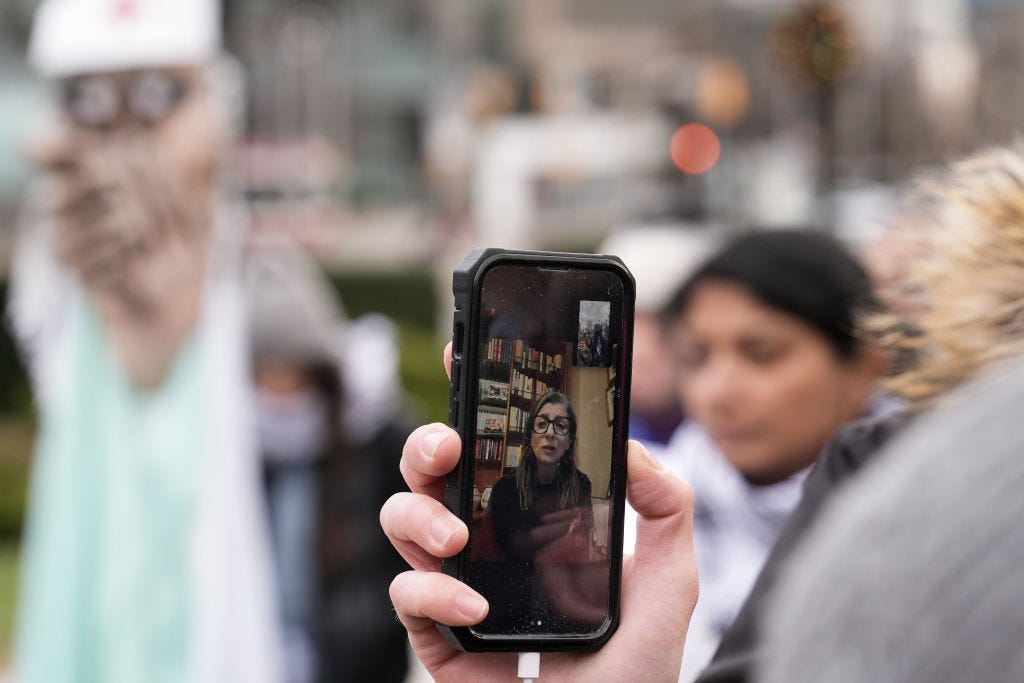
Like nearly everyone, Albanese has lost friends, old friends who “slipped out of her heart” because she saw them in positions of power, in big companies, concentrating on keeping silent about the genocide rather than daring to challenge their management or operate with basic human principles. She laments the fact that in Western society, there’s no real space to grieve collectively. And if there is no space to mourn, then how do we heal?
“It’s not just about making noise, it’s putting pressure and creating disruption … We cannot be clock-worked into acceptance of this brutal violence.”
-Francesca Albanese
In the first days and weeks after the Oct. 7 attack and the ensuing assault on Gaza, Albanese often fell sick, physically and mentally exhausted, and thought she couldn’t go on after seeing image after image of relentless horror and stories of endless suffering. “It was the despair of the mothers mourning their children,” she says, “Oh my god, the mothers.” But it didn’t take long for her strength to kick back in, and this, she stresses to me, is something she wants to be made “loud and clear:” There is so much that can and must be done by individuals, we need to start taking action; we need to unionize, in a way. “It’s not just about making noise, it’s putting pressure and creating disruption, thinking outside the box about peaceful but powerful ways to keep the focus on Palestine and the fate of its people. We must be active. We cannot be clock-worked into acceptance of this brutal violence.” Albanese is an ethical consumer herself, her Twitter bio reads, “solidarity is the political declination of love,” and she lists for me the ways we can take action: support principled journalists, defend those who have been harassed for their stands, pursue domestic legal cases, read, join solidarity movements, speak, protest, research.
“We are at the juncture when the decades of Palestinian resistance – not armed struggle, but I mean their resistance to be seen as a people, as a collective – I know it’s bloody time, but something is blossoming.” She is an emphatic talker, whether sharing her current reading list or her opinion on what the future means. But now, Albanese slows down a touch to stress the importance of what she’s saying. “I do see hope at the end of this dark winter,” she chooses her words deliberately, “and it’s theirs.”
Fatima Bhutto is an award-winning author and journalist. Her most recent books include the novel The Runaways and her non-fiction reportage New Kings of the World. She recently hosted Reframe, a four-part series on the genocide in Gaza, on Al Jazeera.
Make sure you’re signed up to receive ‘The Global South with Fatima Bhutto’ to get all of her columns in your inbox.
The views expressed in this article are the author’s own and do not necessarily reflect those of Zeteo.
Check out more from Zeteo:





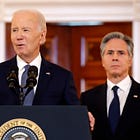
Excellent profile of Francesca Albanese, who has spoken so eloquently against the ongoing genocide. I have great admiration for her integrity and dedication.
R-E-S-P-E-C-T